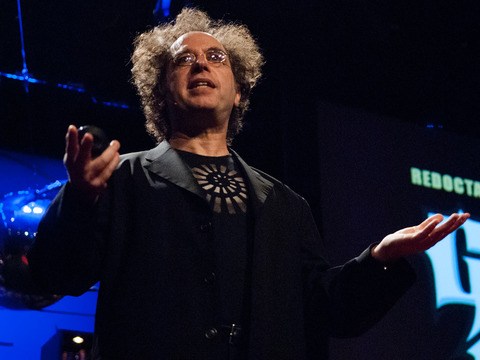Ideas worth spreading. When is an idea worth spreading? Is an idea good by itself? Can inappropriate context ruin an idea? Can a simple idea work within a very motivating context? Here I have a piano. And within music there are ideas. For example, if I play this, (Music) I can see ladies in the audience sighing because it is a wonderful idea. Who doesn't know Beethoven's 'Fur Elise'? Now, this idea needs a context. On the piano, the context is played by the left hand. The left hand plays this. (Music) Perfect. I have an idea and a context. Then, I just have to put them together, So it sounds like this. (Music) Something is wrong. You may notice that this (Music) can't be Beethoven. It is wrong because the melody, the idea, (Music) is in one tone but the context is in another. (Music) This happens often in real life too. You feel like you have an idea but the context is in a different tone. If I take the context and do this. (Music) I change it (Music) and I put it in the same frequency and tone as the idea. (Music) Then, everything starts to work. But this example is easy, if the idea is as wonderful as Beethoven's idea. But imagine that a boy says to me "Hi Fefe" -- they call me Fefe, I don't know why. "Hi Fefe. I want to be a composer and I have composed my first piece, this is the idea I have. (Music) And I say, "Yes, yes, very nice." It reminds me of the story of the father that makes his son study violin and takes him to a friend and says: "Look, Juan, listen how my son plays the violin." The son plays the violin... very badly. (Laughter) And he says: "what do you think about the execution?" "Well, executing him is excessive, a couple of slaps would be enough." (Laughter) But, that wasn't the case. (Applause) Without going that far it occurred to me to say "If this is your idea... (Music) you'd better do something else, son". But, if that child was Frédéric Chopin, a Polish composer of the nineteenth century, he could have written (Music) And with this very simple idea, which could deserve a slap, he composed a prelude, "Prelude in E Minor" a wonderful piece that is played in piano recitals everywhere. So we had these two examples. But, what happens if I say I have an idea, I'm going to be a composer, and this is my idea. (Note) Ha! (Laughter) What do you think? I hear laughs. But be careful, because laughter can be disrespectful because this note, (Note) this idea, can be repeated. (Two notes) Ha! It starts to sound different. I can even change the rhythm -- rhythm is the duration of a note. I can do this. (Notes) If I am Tom Jobim, for example, a Brazilian composer, I can do this. (Music) This is "One-note Samba." you may have noticed why it's called that. (Laughter) Now, this one-note samba makes the most of the idea of one idea - the redundancy is intended - reduced to the expression of a single note. But, speaking of reducing ideas, there is one example which is pretty average. The most interesting example of synthesizing an idea was invented by John Cage, who composed a piece for piano called "4 Minutes 33 Seconds." And in this case, to be faithful to the piece, I'm going to use a score if you don't mind. And I'm going to play just a fragment, because, you know, time is... (Laughter) We could keep going, but I think you get the picture. (Applause) There must be, perhaps, a more intense version somewhere, but it's less interesting for an orchestra. You can listen to it if you want. (Laughter) And, speaking of ideas in music, I'm thinking, to what extent is an idea our own? Really our own. And when does an idea begin to be shared? There is an aria by Mozart from the Don Giovanni opera --Don Juan-- it's the story of a man who is a womanizer and even though he seduces one woman after another, he is never satisfied. This aria is "Là ci darem la mano" where Don Giovanni sings to one of his lovers "come I'll give you my hand, we will go far away, you will accept this, etc." It sounds like this. (Music) Là ci darem la mano, Là mi dirai di sì: Vedi, non è lontano... 'El Reino del Reves' (Spanish nursery rhyme) (Laughter) It's very similar to that nursery rhyme! (Applause) Now, this example is less clear because we can think has this idea been done before? Is it new? A composer, we could say, found things before they were lost. This is a euphemism for stealing. This composer, (Laughter) let's say he is a popular composer, ran out of inspiration. He didn't show inspiration in other work either, but in this case he wanted inspiration, so he searched his old jukebox and his old vinyl discs. To the youngest among you, back then, we didn't have pendrives or CDs. We had vinyl discs, you know. And he played this vinyl disc in search for inspiration; it was a tango. (Music) It was broken. It didn't work. So he threw it away and looked for another and he read on the cover "Muzio Clementi", "Sonatina en sol mayor". Who knows Muzio Clementi? Well, Muzio Clementi was a great composer. He was much less famous than his genius deserved. He was Beethoven's teacher, among others. And in the third movement of that sonata - the one that the composer was using for inspiration - he wrote this. (Music) But the composer thought: "I don't like this. Something is wrong." "And, what is this button for?" There was a button, metronome, that had three numbers: 33, 45 and 78. (Laughter) It was set in 78. So he thought: "This is wrong. Let me put it in 45." (Music) "No. I don't like this either." "Let's see what happens in 33." (Music) I have a hit! (Music) And who, who's going to complain? (Applause) Muzio Clementi died more than 300 years ago. Who is going to remember? Who knows? Only the idiots who go and listen to TED talks and investigate those things. (Laughter) Now, in an unprecedented effort because the sonatina doesn't end there. (Music) It goes on... (Music) This is the next hit. It says: "When I'm feeling happy, when I'm feeling honey. All I have to do is steal another tune". (Laughter) Done! Now I just have to publish it. And we all get rich. Now, I once heard -- whilst we're on the topic of ideas -- I heard Alejandro Dolina say that the genius was not the guy who invented the first phone. The genius was the one who invented the second phone. Because one phone alone is not worth it. (Laughter) In the case of ideas it's the same. Some composers have great ideas. But the really brilliant composers are those who find the second phone for each idea. And that is why one of my favorite and most popular composers is undoubtedly Mozart. We were listening to him before - I mean, I quoted him before - in "Là ci darem la mano." He composed a Sonata in C Major a piano sonata that could be used to tell a story. And the idea sounds like this: it begins when we are born (Music) and then we go to kindergarten. (Music) We play with other children with our friends. Then we grow older, we finish school - elementary school - and then, all of a sudden there she is. Ahh! When I first met my wife, I asked her - I just met her and, playing the piano, I asked - "Do you like music?" She said: "Yes, but never mind, keep playing." (Laughter) She appears... (Music) All is well. "Would you like to go out?" "Yes!" "To have a cup of coffee... have a great time together." There we are, very happy. And this is the time when you have to ask: "Do you like me being a musician?" "Yes!" "Do you like me being a bohemian, not interested in things?" "Love it" "Sign it!" (Laughter) Because I want to have that on the record, because that... (Music) is about to end. "How nice. How about living together? How about getting married?" "OK!" "Let's fix a date." (Music) And then the marriage begins... Oh! (Laughter) This is Mozart, eh? It's Mozart. (Applause) This is Mozart. (Music) The kids. Work. The house. (Music) And then... Is this the life I want? (Music) All you want is to go back to the beginning when you were a child (Music) Ah! There we are -- This is like the beginning. But the beginning was like this. (Music) And now it's like this. (Music) It's not the same... it's alike but it's not the same. Now we have gained a few kilos, lost some hair... The other day I was sitting and my son said to me: "Dad, you are getting bald." (Laughter) And I said: "It's true." because now we're going through the same thing. (Music) But we still enjoy it, right? And you are looking forward - the kids are grown up - to meeting that person that you once knew... (Music) and you feel that you have found her. Ah! But, how was she before? (Music) And now she is... (Music) That's okay, it's close enough. (Laughter) What can you do? I've gained some weight too... (Laughter) "Will we play? Will we go out? "No, let's stay here." (Laughter) "Dr. House isn't that bad" (Laughter) "And Utilísima is so useful, it has recipes and everything! (Laughter) "I like that roast beef with potatoes." And I will end there. (Applause) And now that we're talking about ideas in music that go together, and since we all trust each other and won't tell anyone else I propose that together, we write a hit. Let's write a song that could sell and then we'll distribute the profits. Nobody will know. But, to make a hit we need an idea. An idea could have three notes. There are 7 musical notes, right? C, D, E, F, G, A, B. There are some alterations: flat, sharp... But that doesn't matter. Together, let's create an idea with three notes. Now, over here, give me a note. C, D, E, F, G, A, B? A note? F. F, perfect, F. F. F, what a good idea! People will say, F! Come on! F! F. And you over there? Give me a note. OK. OK. Let's say B. Flat? Sharp? Just B? Flat. B flat. It's getting there, eh? Getting there. Let's see over there, another note? D. Flat? Sharp? D flat. Now. We already have the idea! And in order to make it a hit, - because that's all we want - to be able to sell it very well, and make a lot of money, we have to make something popular. A "bolero" for example, what do you think? (Music) Ah! But - sorry, I have to make the cameramen move a bit - You know what? If this is a bolero, we need lyrics. Boleros have words. This idea needs words. What word can we use? Let's see. You know what? I'm going to tell you something that I learned after many years of studying. If the idea has three notes the text needs three syllables. If you tell me "TEDxRíodelaPlata" there is no way I could do it. Let's see, Max? Could you give me a word? What? Give me a word for a bolero? We are creating a hit here. "So you were..." I was playing the piano Give me something to make a hit. Three notes, one word. This is a bolero. "Ambition" That's it: Ambition! Ambition to love you, to have you ambition for whatever you want! So, let's do something. You remember the idea, right? (Music) Let's see if we can sing this. Please sing "Ambition" in these three notes. (Singing) Ambition. (Laughter) We have a problem here. Let's see. Breathe properly, let's do it again. (Singing) Ambition. Again. (Singing) Ambition. Great! I'm going to fill in the gaps but when the theme comes back we'll sing it loudly. Ready? Let's go. We begin with Ambition (Singing) Ambition. Stop, stop, stop. Now go! Right now. (Singing) Ambition. Louder, louder. (Singing) Ambition. And... (Singing) Ambition. And to make it a real hit, it needs to end with an ovation because, people will think... We're recording this live, right now, so you can buy it at the exit, you can digitalize it. So, over here. Let's do a rehearsal of the ovation like this. (Applause) Everyone over there. (Applause) More, more, right at the back! Great! Very good! You'll do that. And you begin to sing, as the applause grows you stop singing and start clapping. And that's how we finish this TEDxRíodelaPlata. Let's see how it goes, eh? Everybody sing, okay? When I give the signal, we give an ovation. We are recording this, so, be serious. And... three... (Singing) Ambition. (Singing) Ambition. (Singing) Ambition. (Applause) (Singing) Ambition. (Applause) (Music) (Ovation)
Related talks
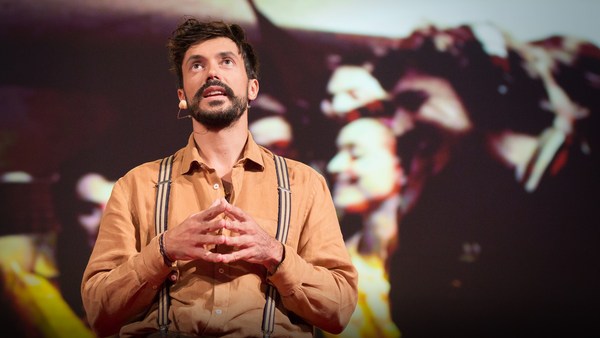
Vincent Moon and Naná Vasconcelos: Hidden music rituals around the world
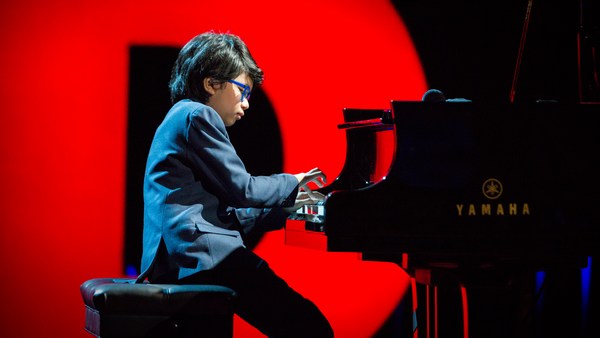
Joey Alexander: An 11-year-old prodigy performs old-school jazz
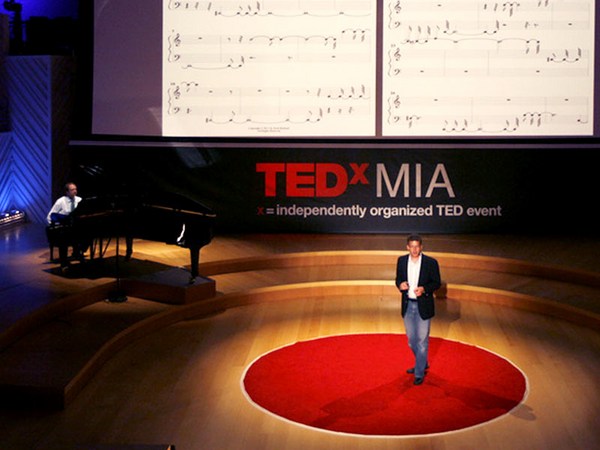
Scott Rickard: The beautiful math behind the world's ugliest music
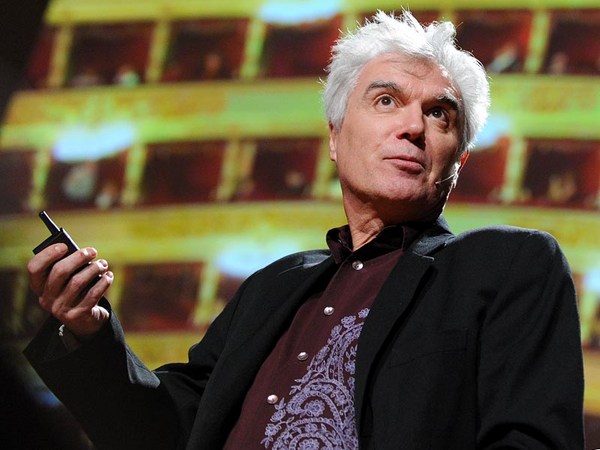
David Byrne: How architecture helped music evolve

Michael Tilson Thomas: Music and emotion through time
